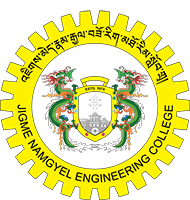Department and Programme Overview
Jigme Namgyel Engineering College has been providing Diploma course in Electronics and Communication Engineering since July 2013. The 2 year programme underlines theoretical and practical aspects in the emerging grounds of technology, in telecommunication Engineering and industrial applications, instrumentation engineering and interconnecting technologies towards electrical engineering.
The programme is aimed at generating skilled workforce at supervisory and technical positions, who would be able to monitor, trouble shoot and operate automated technologies and semi-automated technologies, suitable for manufacturing industries, hydropower stations and corporate organizations. With a dedicated set of competent faculties and further enhancement of existing lab amenities, the department aspires to be a premium course in Telecommunication, Instrumentation, and Computer aided automation and Electronics Engineering.
Curriculum Highlights
Modules in Electronics and Communication Engineering covers the domains of Electrical, Electronics, Communication and IT Engineering. Some of the core engineering subjects offered by the program are:
| Electronic devices and circuits (I & II) | Electronics Measurement and Instrumentation |
| Basic Electrical Engineering | Principles of Communication Engineering , |
| Electrical Workshop Practice -I | Digital Electronics and Logic Circuits |
| Computer Programming and Applications | Physical Networking |
| Microprocessors, Microcontrollers and Interfacing Devices | PCB Design and Simulation |
| Communication Engineering (I & II) |
Practical & Field based Curriculum
- Project Work, practical and research based project in the final semester
- On-the-Job Training/ Industrial Tour/ Field Trip/ Study Tour- Exposure to realize learning in context.
- The exposure to different workplace enables other dimensions to learning and it is ensured through On the Job Training (OJT), which validates and discusses on the existing trends and future technologies. The students are also taken for industrial tours and field visits to provide them a connecting link between the theoretical learning and practical to supplement it.
- The students also do a final year project which is set within the frame of one semester and aims to let students use their creativity, innovation, research skills, team work and analytical skills to sum up their learning. Majority of the projects are research intensive, resulting to modeling and fabrication of semi-automatic, automatic, sensor based and controller based systems.
Learning Outcomes:
Upon the completion of Diploma in Electrical Engineering the graduates would be able to :
- Manage, monitor and supervise the generation, transmission and distribution of electrical power generated and mention about electric load, causes and effects of load variation on a power station from hydroelectric stations.
- Design and draw (using AutoCAD) conduit and electrical layout plan for the installation of motors and machines. Prepare bill of quantities and perform energy auditing.
- Carry out new wirings in PVC / MS conduit, Casing capping, perform different pre-commissioning test batten and test the installation as per rule.
- Draw
and explain control panel for industries and wiring diagram for an induction
motor using different starters
- Repair and maintain electrical machines, motors as well as state various types of faults and its calculations.
- Operate and monitor automated systems.
Career Prospectus
With the establishment of state-of-art lab facilities, programme will refocus its service in the Telecommunication and Industrial Automation towards socio-economic development of country. Research and innovation will be the major focus in the areas of automation in Industrial Applications.
Establishment of fabrication labs and Arduino Learning Centres will enable the students to implement design and modeling, putting their innovative ideas into practice. One of the immediate prospects under the programme envisioned is the automation technology.
With development of competent Human Resource and Facilities, programme intends to be the Centre of excellence in research and innovation for Industrial and Telecommunication Technologies.
For further information about the programme
Head of the Department
Contact number: 17647640
Jigme Namgyel Engineering College
Dewathang: Samdrup Jongkhar
Email: sangaychedup@jnec.edu.bt
